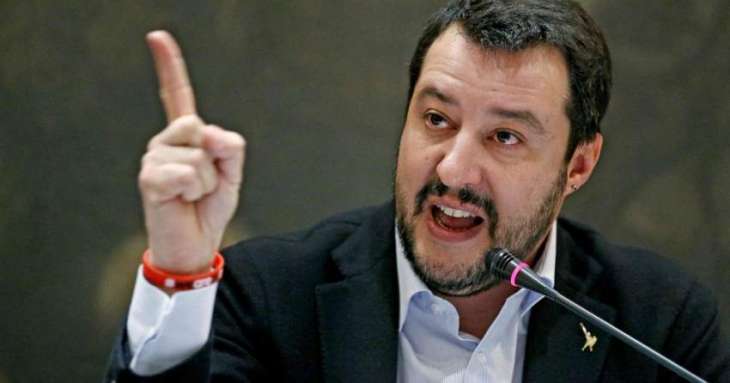Prominent Italian weekly L'Espresso published an explosive allegation on the collusion between Lega (the League) the party of Deputy Prime Minister Matteo Salvini and the Kremlin, without providing the readers with any single quote, fact or sourc
GENOA (Pakistan Point News / Sputnik - 22nd February, 2019) Prominent Italian weekly L'Espresso published an explosive allegation on the collusion between Lega (the League) the party of Deputy Prime Minister Matteo Salvini and the Kremlin, without providing the readers with any single quote, fact or source.
The publication, dated February 21, in one of the most important Italian magazines with leftist views comes soon after the projections on Lega's likely victory in the elections to the European Parliament in May came out.
L'Espresso is financed by GEDI media group, whose main shareholder is an industrial holding (Compagnie Industriali Riunite).
In what the magazine calls an investigation, it claims that on October 18, 2018, when Salvini visited Moscow, a meeting between his adviser Gianluca Savoini and unnamed three Russian men took place, during which a potential deal on diesel supplies and on financial support to Lega were discussed. The weekly, however, does not specify to whom the potential supplies of diesel were intended, how it can be the business of a party leader's adviser, and even admits that it could not get either a confirmation or at least information on whether the deal was concluded or not.
"Let's come back to October 18. That morning at Hotel Metropol in Moscow made some details of the affair clearer. On the one side, there were Gianluca Savoini and two other Italians. On the other side of the table in the conference room of the hotel, which is an architectural pearl of 1900s, there were three Russians. What did they talk about? On a deal that was intended to support the League's finances, to strengthen them ahead of the elections to the European Parliament in the coming May: a supply of 250,000 metric tons of Ultra-low-sulfur diesel (ULSD) a month for one year. In total, it's 3 million tons of diesel in 12 months. And, according to what was established at that meeting of the Metropol, at least as many millions of Euros for the party of Matteo Salvini," the article reads.
The newspaper specified that at the time when it finished its investigation it "did not know how the deal ended, whether the agreement was signed and on what term."
L'Espresso claims that its journalists simply witnessed the meeting at Metropol. However, no quotes that were heard by the journalist are provided.
The magazine continues by tying the alleged secret talks with the meeting that Salvini had the day before, October 17, with representatives of Confindustria [General Confederation of Italian Industry] in Russia, Confindustria Russia.
"On October 17, the Italian vice-premier and minister was a guest at a conference organized by The General Confederation of Italian Industry (Confindustria) at Lotte Hotel. The Russian trip ended with a private meeting that the leader of the League did not want to make public. We asked Minister Salvini if he met his Kremlin counterpart Dmitry Kozak in a specific place after the conference. We sent him specific questions to two email addresses, including the one of the Senate, but we have not received any response," the article reads.
Despite an evident lack of proof for the reader, the magazine comes to a bold conclusion.
"If what we heard then would be put into practice, we would be facing a resounding paradox: a nationalist party, the League of Salvini, was financed for the next European election campaign by a Russian state-owned company. In short, it's the main force at the Italian government that is supported by Putin and a number one enemy of the European Union. All was discussed in Moscow by a man, Savoini, who did not seem to have any title to deal neither with oil nor with the financing of the League," the story reads.
The full investigation is expected to be published on Sunday, February 24. No matter how sound the arguments are going to be there, they will fall on the ground already well-fertilized by the anti-Russian hysteria.
Russian presidential spokesman Dmitry Peskov on Friday declined to comment on the story.
"Who is saying [this]? What sources? What are they based on? ... Let's ask the newspaper what they are basing this on, where the information came from, and so on," Peskov told reporters, when asked to comment.
Sputnik has reached out for comment to all interested parties, but has not heard from them, as of the moment of publication.
In the past, Salvini has already refuted allegations of Moscow supporting his party financially, saying that he had "never received a lira, a euro or a rouble from Russia."
Eurosceptic Lega is expected to score around 32 percent in the elections to the European Parliament in May, expanding the amount of its seats up to 27 from the current six, according to the latest projections published on the European Parliament website on Monday.




